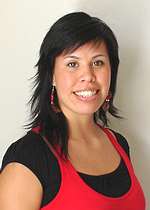 Dara’s project was called the “Aboriginal Young Parent Research Project”. She worked with the Partners Task Group through the host agency, the BC Council for Families. Dara conducted her research through phone interviews to 40 Aboriginal communities in BC about their work with young parents. The project goal was to understand, in the absence of identified Aboriginal young parent services, where these vulnerable and often high risk families are accessing services and support. View Dara’s Report.
Dara’s project was called the “Aboriginal Young Parent Research Project”. She worked with the Partners Task Group through the host agency, the BC Council for Families. Dara conducted her research through phone interviews to 40 Aboriginal communities in BC about their work with young parents. The project goal was to understand, in the absence of identified Aboriginal young parent services, where these vulnerable and often high risk families are accessing services and support. View Dara’s Report.
How well prepared did you feel entering into the project?
At first I did not feel prepared because I knew that what we did in FNIS 320 would not be the same as what was to come in FNIS 400, however I knew there would be a steep learning curve, so I was prepared to feel unprepared.
Three things you learned from/about the organization:
I learned that the BC Council for Families is very well-regarded in the non-profit organization community, and that their good standing made a difference for whether frontline workers in remote communities in BC felt comfortable talking to me through a phone interview. I learned that my own research etiquette would reflect on both the BCCF and UBC, therefore I had to take my role seriously in order to complete my project. I also learned that where there are limited resources, such as in a small non-profit organization, it is important to be resourceful and respectful of the people there.
What was the highlight of the experience?
The highlight of the practicum was the incredible feeling of achievement and being able to see the results of months and months of hard work! As much as I disliked being pushed to make a presentation at the end, I see that it is a skill with great value, and it will not be the last presentation I give, already I have had to use those skills throughout this summer and fall.
What surprised you the most?
That I survived the practicum with relatively smooth sailing. There was nothing that significantly stifled the success of the project, except perhaps that it took much longer than anticipated to analyze the results.
One thing you would do differently next time:
I would give more time for the data analysis. I found this very challenging and overwhelming, and a time when I needed the most guidance from peers and supervisors.
Advice for next year’s students:
Do not underestimate the value of having a thoroughly planned out research proposal. Anticipating potential challenges will prevent much stress and save precious time.
 Faculty of Art
Faculty of Art